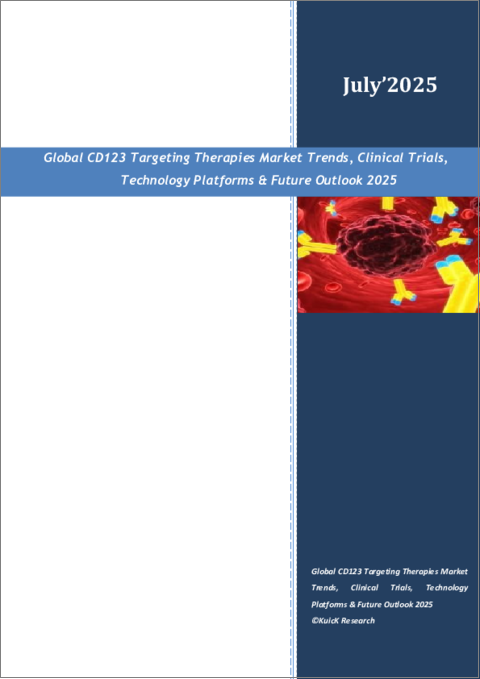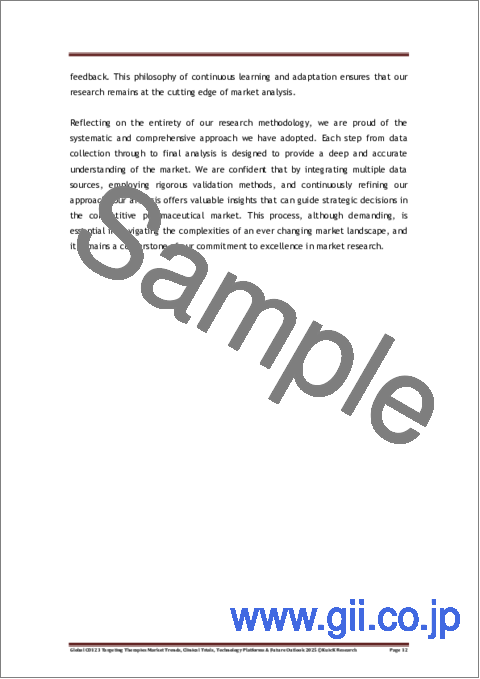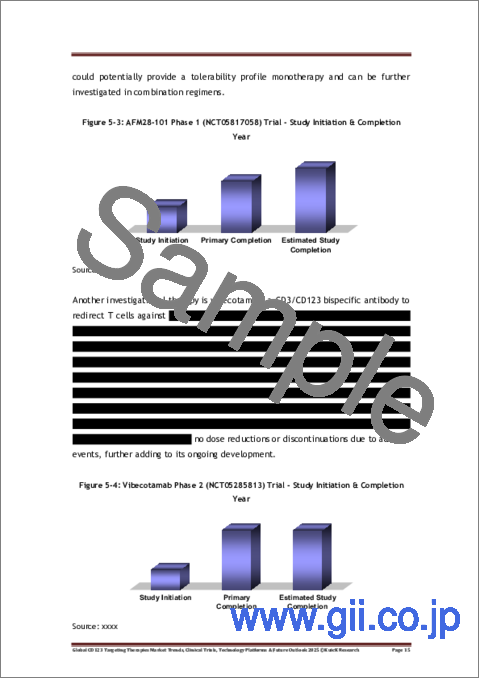|
|
市場調査レポート
商品コード
1763117
CD123標的治療薬の世界市場:市場動向、臨床試験、技術プラットフォーム、将来の見通し(2025年)Global CD123 Targeting Therapies Market Trends, Clinical Trials, Technology Platforms & Future Outlook 2025 |
||||||
|
|||||||
| CD123標的治療薬の世界市場:市場動向、臨床試験、技術プラットフォーム、将来の見通し(2025年) |
|
出版日: 2025年07月01日
発行: KuicK Research
ページ情報: 英文 100 Pages
納期: 即日から翌営業日
|
全表示
- 概要
- 図表
- 目次
CD123標的治療薬の世界市場:市場動向、臨床試験、技術プラットフォーム、将来の見通し(2025年)レポートハイライト:
- 調査手法
- CD123標的治療薬の世界市場分析
- 世界のCD123標的治療薬の開発動向、適応症別
- 承認されたCD123標的治療薬:1
- 臨床試験中のCD123標的治療薬>10種類以上
- 最高開発段階:第II相
- CD123標的治療薬の企業別、国別、適応症別、相別の臨床試験インサイト
- CD123標的治療薬開発技術プラットフォーム
CD123指向性治療薬の市場は、エルゾーリス(tagraxofusp erzs)の承認に支えられ、芽球性形質細胞様樹状細胞腫(BPDCN)という稀な適応症にとどまらず、より広範な血液がん領域へと活気を帯びつつあります。IL 3と融合した切断型ジフテリア毒素であるElzonrisは、2018年後半に承認された最初のCD123指向性薬剤でした。その承認は、標的化可能な実体としてのCD123の前例となりましたが、その使用は主にBPDCN患者のマイナーなコホートに限定されてきました。
現在、急性骨髄性白血病(AML)や骨髄異形成症候群(MDS)のような、より一般的で致命的ながんの治療にこの基盤を使用することに焦点が移りつつあります。タグラキソフスプは、低メチル化剤やベネトクラックスとの併用で、奏効の深化と分子進化に基づく耐性の克服を目標に研究されています。これらの初期結果は、CD123療法が希少疾病の適応を超え、より広いがん領域へ進出できることを強調しています。
いくつかの巨大製薬企業が投資シーンを再構築しています。AbbVieは、ImmunoGenの買収後、ピベキマブ・スニリン(pivekimab sunirine)を買収しました。ピベキマブはCD123を標的とする非常に有効な抗体薬物複合体であり、BPDCNやその他のCD123発現悪性腫瘍の治療薬として、2020年に希少疾病用医薬品とブレークスルー・セラピー(画期的治療薬)の指定を受けています。一方、Innate Pharmaは、CD123、NKp46、CD16レセプターに同時に結合するファーストインクラスタイプの三機能性NK細胞エンゲイジャーであるIPH6101/SAR443579をSanofiと共同開発しています。この新しいメカニズムにより、非常に効果的なNK細胞リクルートメントと良好な安全性シグナルが得られ、再発または難治性AML患者における早期の長期完全寛解により実証されました。
リンパ球を介する治療の枠を超え、開発者は選択性を高める高度な工学的手法に注力しています。InnateのANKET(R)プラットフォームはIPH6101を強化し、NK細胞を活性化してサイトカインの放出を最小限に抑えながら抗白血病作用を発揮します。同時に、バイオテクノロジー企業は、CD123の共通発現から考えられた戦略である、がん性前駆細胞と健康な前駆細胞を区別するための安全スイッチと親和性チューニングを備えたCAR Tコンストラクトを研究しています。
民間資本の注入は、技術革新をさらに推進します。10月2024日のAvenCell therapeuticsに対するシリーズBの1億1,200万米ドルの資金調達は、プログラマブルでスイッチ可能なCD123 CARプラットフォームに対する投資家の信頼の指標です。AvenCellの抗体薬物複合体は、外部制御分子がCAR Tの作用を切り替えるというスタイルの制御スキームで、用量制限毒性に対する解決策をもたらす可能性があり、真に個別化された免疫療法に向かう傾向にあります。
細胞療法が進歩する一方で、非細胞療法も進出しています。リンカーやペイロード、二重特異性を変えて設計された二重特異性抗体や抗体薬物複合体は、忍容性と標的活性の向上を示しています。このような改良は、治療指標を高めながら正常な造血を維持することを意図しています。これらの改良型は、サイトカイン放出や毛細血管漏出などの標的外活性を制限することを意図した第二世代のCD123標的薬剤です。
市場の勢いは適応拡大によっても後押しされています。CD123の過剰発現は、AML、MDS、高リスクMDS、毛様細胞白血病を含む様々な血液がんで見られるため、子会社は適応症を軸とした適応性のある臨床プログラムの開発に取り組んでいます。CD123プラットフォームは、より広範な治療領域で切望されています。
このような動向に支えられ、精密腫瘍学技術はよりスマートな開発を促進しています。CD123抗原密度を測定し、患者特異的な発現プロファイルを特徴付ける洗練された診断法は、試験登録と奏効予測に情報を提供します。この精密戦略は開発のリスクを軽減し、より効果的な治療の位置づけを容易にします。
要するに、CD123標的治療薬市場は革命的な変化の時期にあります。初期の臨床検証に支えられ、現在では製薬企業の戦略的関与、最先端のプラットフォーム、投資家の広範な支援、適応症の多様化によって後押しされ、このカテゴリーは狭いBPDCNのニッチから血液学的領域へと拡大しつつあります。先進治療が成熟を続け、併用戦略が実現されるにつれて、CD123は次世代標的腫瘍学の柱となります。
当レポートは、世界のCD123標的治療薬市場について調査し、市場の概要とともに、薬剤動向、臨床試験動向、地域別動向、および市場に参入する企業の競合情勢などを提供しています。
目次
第1章 調査手法
第2章 CD123標的治療薬のイントロダクション
第3章 科学的・生物学的洞察
- CD123(IL-3Ra)の構造、生物学および意義
- CD123を標的とする根拠
- バイオマーカーとしてのCD123
第4章 CD123を標的とした治療法
- 融合タンパク質
- 抗体
- 抗体薬物複合体
- 細胞療法
- 治療用ペプチド
第5章 世界のCD123標的治療薬の開発動向、適応症別
- 白血病
- 芽球性形質細胞様樹状細胞腫瘍
- 骨髄増殖性腫瘍
- その他
第6章 CD123標的治療薬の開発技術プラットフォーム
第7章 世界のCD123標的治療薬市場分析
- 現在の市場シナリオ
- 将来の市場機会
第8章 エルゾンリスの臨床および商業的洞察
- 概要
- 価格と投与量
- 補償範囲と償還シナリオ
第9章 CD123標的治療薬の臨床試験の概要
- 企業別
- 国別
- 適応症別
- 相別
- 優先ステータス別
第10章 CD123標的治療薬の世界臨床パイプラインの概要(企業、国、適応症、相別)
- 前臨床
- 第I相
- 第I/II相
- 第II相
第11章 上市済みCD123標的治療薬の臨床的洞察
第12章 世界のCD123標的治療薬市場力学
- 市場促進要因と機会
- 市場の課題と抑制要因
第13章 競合情勢
- AbbVie
- Affimed
- Aptevo Therapeutics
- Arcellx
- AstraZeneca
- AvenCell Therapeutics
- CSL Limited
- Essen Biotech
- Innate Pharma
- Lava Therapeutics
- Macrogenics
- Molecular Partners
- Stemline Therapeutics
- Vincerx Pharma
List of Figures
- Figure 2-1: Evolution of CD123-Targeted Therapies
- Figure 3-1: CD123 - Expression Levels Across Cell Types
- Figure 3-2: CD123 - Expression In Normal vs. Malignant Stem Cells
- Figure 3-3: CD123 Targeted Therapies - Overview
- Figure 3-4: CD123 As Biomarker For Patient Stratification
- Figure 4-1: CD123 Targeting Fusion Protein - Structure
- Figure 4-2: CD123 Fusion Proteins - Mechanism Of Action
- Figure 4-3: CD123 Targeting Antibodies - Mechanism Of Action
- Figure 4-4: CD123 Targeting ADCs - Structure & Mechanism Of Action
- Figure 4-5: CD123 CAR T Cells
- Figure 4-6: Therapeutic Peptides - Mechanism of Action
- Figure 5-1: Leukemia - CD123 Driven Signaling Pathway
- Figure 5-2: CD123 - Expression Across Leukemia Subtypes
- Figure 5-3: AFM28-101 Phase 1 (NCT05817058) Trial - Study Initiation & Completion Year
- Figure 5-4: Vibecotamab Phase 2 (NCT05285813) Trial - Study Initiation & Completion Year
- Figure 5-5: CART123 Phase 1 (NCT03766126) Trial - Study Initiation & Completion Year
- Figure 5-6: VNC-943-101 Phase 1 (NCT06034275) Trial - Study Initiation & Completion Year
- Figure 5-7: CP-MGD024-01 Phase 1 (NCT05362773) Trial - Study Initiation & Completion Year
- Figure 5-8: TAGVEN Phase 2 (NCT07007052) Trial - Study Initiation & Completion Year
- Figure 5-9: Tagraxofusp Phase 2 (NCT04216524) Trial - Study Initiation & Completion Year
- Figure 5-10: IMGN632-0801 Phase 1/2 (NCT03386513) Trial - Study Initiation & Completion Year
- Figure 5-11: UHKT-CAR123-01 Early Phase 1 (NCT06765876) Trial - Study Initiation & Completion Year
- Figure 5-12: PBC065 Phase 1 (NCT06690827) Trial - Study Initiation & Completion Year
- Figure 5-13: STUDY00160238 Phase 1 (NCT06414681) Trial - Study Initiation & Completion Year
- Figure 5-14: HSR210434 Phase 1 (NCT05233618) Trial - Study Initiation & Completion Year
- Figure 5-15: Tagraxofusp Phase 1/2 (NCT05038592) Trial - Study Initiation & Completion Year
- Figure 5-16: IMGN632-0801 Phase 1/2 (NCT03386513) Trial - Study Initiation & Completion Year
- Figure 5-17: Flotetuzumab Phase 1 (NCT04681105) Trial - Study Initiation & Completion Year
- Figure 6-1: ICE Platform - Affimed
- Figure 6-2: ADAPTIR - Aptevo Therapeutics
- Figure 6-3: ARC-SparX - Arcellx
- Figure 6-4: Universal Targeting Platform - AvenCell
- Figure 6-5: ANKET - Innate Pharma
- Figure 6-6: GAMMABODY(R) Platform - LAVA Therapeutics
- Figure 6-7: GAMMABODY(R) Platform Mechanism - LAVA Therapeutics
- Figure 6-8: DART Platform - MacroGenics
- Figure 6-9: VersAptx - Vincerx Pharma
- Figure 7-1: CD123 Targeted Therapy Market - Future Opportunities
- Figure 8-1: Elzonris - Price Per Vial By Region (US$), July'2025
- Figure 9-1: Global - CD123 Targeting Therapy Clinical Pipeline By Company (Number Of Therapies), 2025
- Figure 9-2: Global - CD123 Targeting Therapy Clinical Pipeline By Country (Number Of Therapies), 2025
- Figure 9-3: Global - CD123 Targeting Therapy Clinical Pipeline By Indication (Number Of Therapies), 2025
- Figure 9-4: Global - CD123 Targeting Therapy Clinical Pipeline By Phase (Number Of Therapies), 2025
- Figure 9-5: Global - CD123 Targeting Therapy Clinical Pipeline By Priority Status (Number Of Therapies), 2025
- Figure 12-1: CD123 Targeted Therapy Market - Drivers & Opportunities
- Figure 12-2: CD123 Targeted Therapy Market - Challenges & Restraints
List of Tables
- Table 8-1: Elzonris - Recommended Dosage Modifications
- Table 8-2: Elzonris - CLS Management Guidelines
Global CD123 Targeting Therapies Market Trends, Clinical Trials, Technology Platforms & Future Outlook 2025 Report Highlights:
- Research Methodology
- Global CD123 Targeting Therapies Market Analysis
- Global CD123 Targeting Therapies Development Trends By Indication
- Approved CD123 Targeting Therapies: 1
- CD123 Targeting Therapies In Clinical Trials: > 10 Therapies
- Highest Phase Of Development: Phase-II
- CD123 Targeting Therapies Clinical Trials Insight By Company, Country, Indication & Phase
- CD123 Targeting Therapies Development Technology Platforms
The market for CD123 directed therapies, anchored by the approval of Elzonris (tagraxofusp erzs), is undergoing a vibrant transition into the broader space of hematologic cancers beyond the rare indication of Blastic Plasmacytoid Dendritic Cell Neoplasm (BPDCN). Elzonris, a truncated diphtheria toxin fused to IL 3, was the first CD123 directed agent approved in late 2018. Its approval set a precedent for CD123 as a targetable entity, but its use has largely been limited to a minor cohort of patients with BPDCN.
Focus is now shifting to using this foundation to treat more common and deadly cancers such as acute myeloid leukemia (AML) and myelodysplastic syndromes (MDS). Tagraxofusp is being investigated in combination with hypomethylating agents and venetoclax, with the goal of enhancing depth of response and overcoming resistance based on molecular evolution. These initial results highlight the ability of CD123 therapies to break into the wider oncology space beyond orphan indications.
Several pharma giants are reshaping the investment scene. AbbVie, following its ImmunoGen acquisition, took over pivekimab sunirine, a highly effective CD123 targeting antibody drug conjugate that has received orphan drug and Breakthrough Therapy designations in 2020 to treat BPDCN and other CD123 expressing malignancies. Innate Pharma, on the other hand, is developing IPH6101/SAR443579, a trifunctional NK cell engager of first-in-class type that binds CD123, NKp46, and CD16 receptors simultaneously, with Sanofi as a collaborator. This new mechanism provides highly effective NK cell recruitment and good safety signals, demonstrated by early long-lasting complete remissions in patients with relapsed or refractory AML.
Expanding beyond lymphocyte mediated treatments, developers are focusing on sophisticated engineering to enhance selectivity. Innate's ANKET(R) platform powers IPH6101, activating NK cells to generate anti-leukemic actions with minimal cytokine release, a possible means to avoid some of the toxicity linked with CD3 based treatments. At the same time, biotech companies are investigating CAR T constructs with safety switches and affinity tuning to distinguish between cancerous and healthy progenitor cells, a strategy conceived from shared expression of CD123.
Private capital infusion drives innovation even further. October 2024's Series B funding of US$ 112 million for AvenCell therapeutics is an indicator of investors' confidence in programmable, switchable CD123 CAR platforms. AvenCell's antibody drug conjugates style control scheme, in which external regulator molecules will switch CAR T action, has the potential to bring a solution to dose limiting toxicities, trending towards truly individualized immunotherapies.
While cell therapies improve, non-cellular modalities make inroads. Bispecific and antibody drug conjugates modalities, designed with altered linkers, payloads, or bi-specificity, are showing enhanced tolerability and targeted activity. Such improvements intend to maintain normal hematopoiesis while enhancing therapeutic indices. These engineered forms are second generation CD123 targeting agents intended to limit off-target activities, including cytokine release and capillary leak.
Market momentum is also fueled by expanding indications. CD123 overexpression is seen in various hematologic cancers, including AML, MDS, high-risk MDS, and hairy cell leukemia, leading subsidiaries to develop adaptable clinical programs that can pivot indications. The variety increases return potential for developers, and CD123 platforms are coveted across a broader therapeutic spectrum.
Backed by these trends, precision oncology technologies facilitate smarter development. Sophisticated diagnostics measuring CD123 antigen density and characterizing patient-specific expression profiles inform trial enrollment and response prediction. This precision strategy de-risks development and facilitates more effective therapeutic positioning.
In short, the CD123 targeted therapy market is at a period of revolutionary change. Tethered by early clinical validation, now boosted by strategic pharma engagement, cutting edge platforms, expansive investor support, and indication diversification, this category is evolving from a narrow BPDCN niche to expanding hematologic reach. As advanced therapies continue to mature and combination strategies are realized, CD123 is set to be an anchor pillar in next generation targeted oncology.
Table of Contents
1. RESEARCH METHODOLOGY
2. Introduction To CD123 Targeting Therapies
- 2.1 Introduction
- 2.2 History & Evolution
3. Scientific & Biological Insight
- 3.1 Structure, Biology & Significance Of CD123 (IL-3Ra)
- 3.2 Rationale For Targeting CD123
- 3.3 CD123 As Biomarker
4. Therapeutic Approaches Targeting CD123
- 4.1 Fusion Proteins
- 4.2 Antibodies
- 4.3 Antibody Drug Conjugates
- 4.4 Cell Therapies
- 4.5 Therapeutic Peptides
5. Global CD123 Targeting Therapies Development Trends By Indication
- 5.1 Leukemia
- 5.2 Blastic Plasmacytoid Dendritic Cell Neoplasm
- 5.3 Myeloproliferative Neoplasms
- 5.4 Other Indications
6. CD123 Targeting Therapies Development Technology Platforms
7. Global CD123 Targeting Therapies Market Analysis
- 7.1 Current Market Scenario
- 7.2 Future Market Opportunity
8. Elzonris Clinical & Commercial Insight
- 8.1 Overview
- 8.2 Pricing & Dosage
- 8.3 Coverage & Reimbursement Scenario
9. CD123 Targeting Therapies Clinical Trials Overview
- 9.1 By Company
- 9.2 By Country
- 9.3 By Indication
- 9.4 By Phase
- 9.5 By Priority Status
10. Global CD123 Targeting Therapies Clinical Pipeline Overview By Company, Country, Indication & Phase
- 10.1 Preclinical
- 10.2 Phase I
- 10.3 Phase I/II
- 10.4 Phase II
11. Marketed CD123 Targeting Therapy Clinical Insight
12. Global CD123 Targeting Therapies Market Dynamics
- 12.1 Market Drivers & Opportunities
- 12.2 Market Challenges & Restraints
13. Competitive Landscape
- 13.1 AbbVie
- 13.2 Affimed
- 13.3 Aptevo Therapeutics
- 13.4 Arcellx
- 13.5 AstraZeneca
- 13.6 AvenCell Therapeutics
- 13.7 CSL Limited
- 13.8 Essen Biotech
- 13.9 Innate Pharma
- 13.10 Lava Therapeutics
- 13.11 Macrogenics
- 13.12 Molecular Partners
- 13.13 Stemline Therapeutics
- 13.14 Vincerx Pharma






